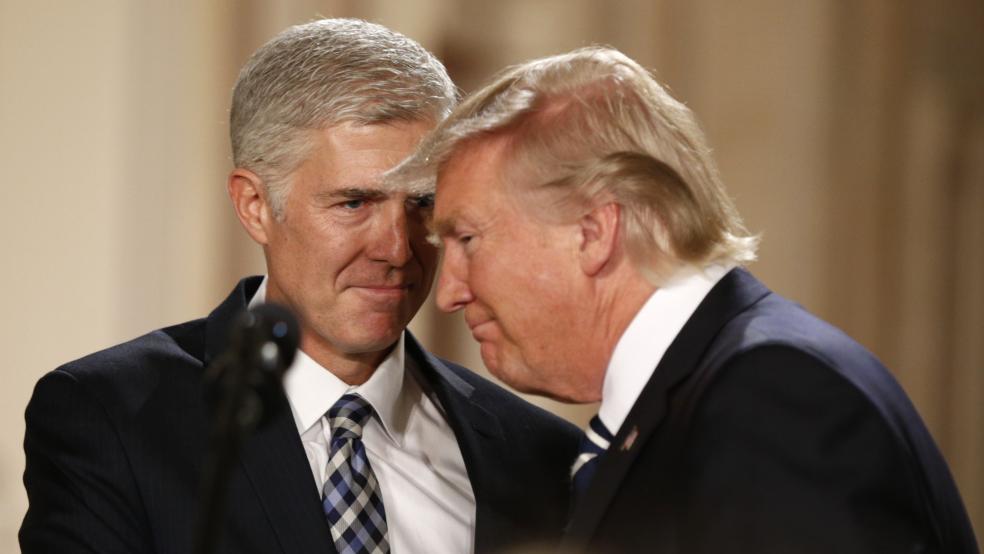It cannot have been an easy weekend for Judge Neil Gorsuch. At a time that ought to be one of the high points of his life, one wonders if the Colorado jurist tapped by President Trump to fill the empty seat on the Supreme Court might not be quietly second-guessing his decision to answer the phone when the White House called.
Gorsuch was already looking at a really, really painful confirmation process that could result in the Republican Senate majority invoking the so-called “nuclear option” to get him confirmed over Democratic objections. But on Saturday, Trump likely made the entire ordeal infinitely worse.
Related: Judge Grants Nationwide Temporary Restraining Order on Trump Travel Ban
At around the time people in Denver were getting up for breakfast on Saturday morning, Trump was rage-tweeting about a federal judge in Seattle. Judge James Robart, late Friday, issued a temporary restraining order blocking the enforcement of the key elements of Trump’s executive order banning refugees and the residents of seven majority Muslim countries from entering the United States.
It would have been around 6:12 a.m. Denver time when Trump fired off a tweet that set the legal and political worlds ablaze. And if Judge Gorsuch found his cornflakes turning to ashes in his mouth at that moment, well, it would be no surprise.
The opinion of this so-called judge, which essentially takes law-enforcement away from our country, is ridiculous and will be overturned!
— Donald J. Trump (@realDonaldTrump) February 4, 2017
Trump, with his attack on Robarts as a “so-called” judge, had by most accounts crossed a serious red line. Presidents have often criticized judicial rulings. President Obama famously used a State of the Union address, with Supreme Court Justices arrayed in front of him, to blast their decision in the Citizens United campaign finance case.
Related: Is Trump’s Travel Ban Already Hurting US Tourism?
But criticizing a decision and questioning the legitimacy of the court are not the same thing. Writing for the Washington Post’s Volokh Conspiracy blog -- hardly a bastion of liberal bias -- Will Baude, an assistant professor at the University of Chicago Law School, seemed fairly stunned, calling the distinction “deadly serious.”
If the court has authority, then the parties are legally required to follow its judgment: even if it is wrong; even if it is very wrong; even if the President does not like it. But if the court does not have authority, then perhaps it can be defied. So the charge of a lack of authority is a much more serious one. It is the possible set-up to a decision to defy the courts — a decision that is unconstitutional if the court does indeed have authority to decide the case.
On Twitter, Baude’s University of Chicago colleague, law professor Eric Posner, wrote, “Neil Gorsuch must condemn Trump for ‘so-called judge’ remark; his friends in the legal community must withhold their support until he does.” When someone responded that Trump might revoke the nomination at such an affront, Posner said simply, “That’s the price of integrity.”
Integrity becomes an issue here because, while federal judges are appointed by presidents, they are not supposed to be beholden to them. And Trump’s attack on Robarts, as Posner effectively makes clear, is going to require a response from Gorsuch. That response may come Sunday, or it may have to wait until his confirmation hearings, but at some point in the near future, Gorsuch is going to be asked to condemn the man who appointed him to the highest court -- and to do it in the most public of forums.
This isn’t the first example of Trump attacking the legitimacy of a federal judge. Famously, during his campaign for the Republican presidential nomination, he spent weeks attacking Gonzalo Curiel, the District Court judge in California who heard a class-action suit against the now-defunct Trump University. Trump frequently claimed that Curiel, who was born in Indiana, could not be objective about the case because his parents came to the US from Mexico.
Related: Trump Inherits a Solid Job Market. Can He Really Make It Better?
All of this can only complicate the situation for Gorsuch. He is, by virtual acclamation of the legal community, a brilliant legal mind and an eminently qualified candidate for Supreme Court Justice. He is also, it would appear, a man with a conscience.
With his first phone call after the nomination was made official, he seemed to acknowledge that he knew he had already bitten into the fruit of a poisonous tree. That call went to Judge Merrick Garland, the eminently qualified candidate nominated by President Obama last year who was denied a hearing or a vote in an utterly unprecedented power grab by the Republican-led Senate.
Gorsuch himself had previously spoken out against unseemly partisan delays in the process of confirming judicial appointments, and his decision to call Garland, made “out of respect” according to the White House, looked to many like the act of a man at least troubled by the circumstances in which he finds himself.
Trump, furious at his first collision with the checks and balances built into the Constitution, did his first Supreme Court nominee no favors on Saturday.





